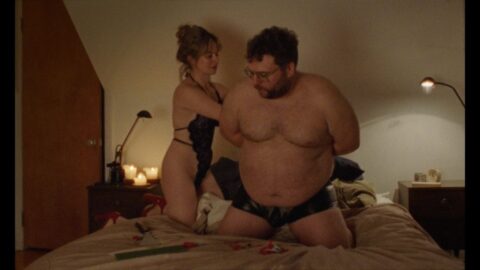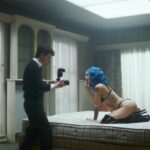The opening scene of Follies (2025), Éric K. Boulianne’s hilarious Canadian relationship dramedy, sets the tone in one long, nearly unbroken shot. Married couple François (Boulianne) and Julie (Catherine Chabot) sit across from a younger couple who casually — and with unnerving ease — lay bare the details of their sex life over dinner. She’s into rim jobs. He’s not. Something about vaginitis and hygiene. So, they opened up the relationship. Then, without missing a beat, they toss the question over like a hot potato: What about you two? Ever experimented?
That question lingers. Are we really happy in monogamy — or just too cautious (and complacent) to find out?
Soon enough, François and Julie decide to experiment; first together, then on their own. What follows is one of the sharpest, most observant, and consistently hilarious comedies of the year: part relationship autopsy, part absurdist rom-com, entirely its own thing.
Follies thrives in the subtle, often uncomfortable friction that emerges when long-term intimacy collides with newfound freedom. The real tension doesn’t just exist between François and Julie — it simmers within each of them. Julie approaches their open arrangement with a mix of hesitance and intrigue, initially more observer than participant. But when she experiences a real spark with another couple, François spirals, abruptly enlisting his father for a last-minute 10 p.m. babysitting shift so he can sneak off to a sex club and soothe his bruised ego. When Julie returns home hours later and finds out he went out, she can’t help but feel disappointed, and delivers a quietly devastating line: “I couldn’t wait to tell you about my night.”
It’s not the first film to tackle heteronormativity in crisis, but few do it with such economy, insight, and crackling wit. In just 100 minutes, Boulianne digs into uncomfortable questions about desire, trust, sexual identity and middle-aged restlessness, continuously finding funny and emotionally real answers. He’s a seasoned screenwriter, so it’s no surprise that the script is sharp; it’s his direction that’s the real surprise: confident, fluid, and free of the usual debut-film jitters. Everything just clicks.
A huge part of that success stems from the real magic between Boulianne and Chabot. Their chemistry is sarcastic, warm, occasionally bruised, entirely convincing. They come across as a couple with 16 years of shared history — not just in what they say, but in what they leave unsaid. The dialogue feels lived-in and effortless, and scenes often end on quiet, unexpected notes rather than tidy dramatic beats. The plot drifts in the best possible way, mirroring the emotional push and pull of two people reevaluating everything they thought they understood.
Did I mention they have two kids? François and Julie make the bold (possibly reckless, definitely hilarious) decision to keep their young daughters fully clued in on the relationship drama — the results are comedy gold. These kids steal every scene and deliver some of the film’s biggest, weirdest laughs. Whether they’re forming offscreen polycules at recess, interrogating their parents about their love lives, or freaking out about being watched while they sleep, they bring chaotic heart and zany wit to an already emotionally packed film.
Follies feels fun and modern when it goes beyond just experimenting with other couples. Both François and Julie have dalliances with members of the same sex, and during a work trip, one of them casually meets someone with a dominant streak, awakening a long-dormant interest in BDSM. The couple’s open, non-judgmental reactions to these experiences — both together and individually — breathe fresh life into an already exciting film about married, straight folks exploring new horizons.
But what’s most surprising is how tender Follies becomes, without ever tipping into the saccharine. Beneath all the hookups and post-hookup chatter is a deep affection for its characters. We’re watching two people take real emotional risks; not for novelty’s sake, but in a sincere attempt to reconnect. To push past habit. And to excavate desires buried under years of routine and share them — awkwardly, bravely — with the person who knows them best. That emotional throughline sneaks up on you.
The ending (no spoilers) is one of those rare conclusions that feels not only earned, but kind of euphoric. Call it modern, ecstatic, transcendent — whatever fits. More than anything, it’s exactly what the characters, and maybe the audience, too, needed all along.
Editor-at-large Jared loves movies and lives with Kiki in Berlin.





